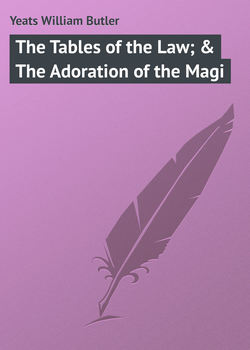The Tables of the Law; & The Adoration of the Magi

Реклама. ООО «ЛитРес», ИНН: 7719571260.
Оглавление
William Butler Yeats. The Tables of the Law; & The Adoration of the Magi
THE TABLES OF THE LAW
I
II
THE ADORATION OF THE MAGI
Отрывок из книги
'Will you permit me, Aherne,' I said, 'to ask you a question, which I have wanted to ask you for years, and have not asked because we have grown nearly strangers? Why did you refuse the berretta, and almost at the last moment? When you and I lived together, you cared neither for wine, women, nor money, and had thoughts for nothing but theology and mysticism.' I had watched through dinner for a moment to put my question, and ventured now, because he had thrown off a little of the reserve and indifference which, ever since his last return from Italy, had taken the place of our once close friendship. He had just questioned me, too, about certain private and almost sacred things, and my frankness had earned, I thought, a like frankness from him.
When I began to speak he was lifting to his lips a glass of that old wine which he could choose so well and valued so little; and while I spoke, he set it slowly and meditatively upon the table and held it there, its deep red light dyeing his long delicate fingers. The impression of his face and form, as they were then, is still vivid with me, and is inseparable from another and fanciful impression: the impression of a man holding a flame in his naked hand. He was to me, at that moment, the supreme type of our race, which, when it has risen above, or is sunken below, the formalisms of half-education and the rationalisms of conventional affirmation and denial, turns away, unless my hopes for the world and for the Church have made me blind, from practicable desires and intuitions towards desires so unbounded that no human vessel can contain them, intuitions so immaterial that their sudden and far-off fire leaves heavy darkness about hand and foot. He had the nature, which is half monk, half soldier of fortune, and must needs turn action into dreaming, and dreaming into action; and for such there is no order, no finality, no contentment in this world. When he and I had been students in Paris, we had belonged to a little group which devoted itself to speculations about alchemy and mysticism. More orthodox in most of his beliefs than Michael Robartes, he had surpassed him in a fanciful hatred of all life, and this hatred had found expression in the curious paradox – half borrowed from some fanatical monk, half invented by himself – that the beautiful arts were sent into the world to overthrow nations, and finally life herself, by sowing everywhere unlimited desires, like torches thrown into a burning city. This idea was not at the time, I believe, more than a paradox, a plume of the pride of youth; and it was only after his return to Ireland that he endured the fermentation of belief which is coming upon our people with the reawakening of their imaginative life.
.....
'You will perhaps have forgotten,' he said, 'most of what you have read about Joachim of Flora, for he is little more than a name to even the well read. He was an abbot in Cortale in the twelfth century, and is best known for his prophecy, in a book called Expositio in Apocalypsin, that the Kingdom of the Father was passed, the Kingdom of the Son passing, the Kingdom of the Spirit yet to come. The Kingdom of the Spirit was to be a complete triumph of the Spirit, the spiritualis intelligentia he called it, over the dead letter. He had many followers among the more extreme Franciscans, and these were accused of possessing a secret book of his called the Liber Inducens in Evangelium Æternum. Again and again groups of visionaries were accused of possessing this terrible book, in which the freedom of the Renaissance lay hidden, until at last Pope Alexander IV. had it found and cast into the flames. I have here the greatest treasure the world contains. I have a copy of that book; and see what great artists have made the robes in which it is wrapped. The greater portion of the book itself is illuminated in the Byzantine style, which so few care for to-day, but which moves me because these tall, emaciated angels and saints seem to have less relation to the world about us than to an abstract pattern of flowing lines that suggest an imagination absorbed in the contemplation of Eternity. Even if you do not care for so formal an art, you cannot help seeing that work where there is so much gold, and of that purple colour which has gold dissolved in it, was valued at a great price in its day. But it was only at the Renaissance the labour was spent upon it which has made it the priceless thing it is. The wooden boards of the cover show by the astrological allegories painted upon them, as by the style of painting itself, some craftsman of the school of Francesco Cossi of Ferrara, but the gold clasps and hinges are known to be the work of Benvenuto Cellini, who made likewise the bronze box and covered it with gods and demons, whose eyes are closed, to signify an absorption in the inner light.'
I took the book in my hands and began turning over the gilded, many-coloured pages, holding it close to the candle to discover the texture of the paper.
.....